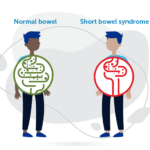Vitamin D: Absorption matters

If you’ve been hearing more about vitamin D recently, that’s because a growing number of studies have linked this nutrient to a range of potential health benefits, from a lower risk of flu to protection against cancer. Although the evidence isn’t firm for all of the many claims made about vitamin D, we do know that it’s crucial for strong, healthy bones, says Brittany DePaula, a registered dietitian in the Center for Advanced Intestinal Rehabilitation at Boston Children’s Hospital. But not every child gets adequate amounts of this important vitamin.
What parents should know
Kids can develop vitamin D deficiency for several reasons, including poor diet, obesity, breastfeeding, and inadequate sun exposure. Indeed, vitamin D is called the “sunshine vitamin” because our bodies make it in response to ultraviolet light. But most of us need to get adequate amounts of vitamin D through our diets — from sources like milk, yogurt, eggs, fish, and fortified cereal and orange juice — or supplements. It’s a fat-soluble nutrient, which means that it’s best absorbed when consumed with some dietary fat.
That can be a problem for kids with certain gastrointestinal disorders, including short bowel syndrome. This rare but serious condition can occur when a child either loses or is born without enough small intestine, preventing the body from extracting the nutrients it needs to survive. Children with short bowel syndrome often need to receive their nutrition intravenously or through a feeding tube.
“A lot of kids with short bowel syndrome can’t absorb fat well, so they can become deficient in vitamin D even if they’re supplementing with it,” DePaula explains. Here’s what else parents of kids with short bowel syndrome should know about vitamin D.
1. Deficiency isn’t always obvious.
In its most severe forms, vitamin D deficiency can lead to rickets, a disorder marked by weak, soft bones. It can also increase your child’s risk of fractures, and delayed growth and development. But these consequences aren’t apparent immediately. “That’s why we want kids to come back for screening even if they feel fine,” says DePaula.
2. Screening is critical.
Your child’s clinician can screen them for vitamin D using a simple blood test. A typical screening schedule for kids with short bowel syndrome involves tests every six or 12 months unless a child is deficient. In that case, more frequent screening is usually recommended.
3. A prescription may be necessary.
Over-the-counter vitamin D supplements aren’t as concentrated, so your child’s clinician may prescribe a higher dose instead. They may also recommend calcium supplements, since this mineral helps ensure optimal vitamin D levels.
4. The dose can vary.
Every child is different, and there isn’t a one-size-fits-all approach to vitamin D dosages. “A number of factors can determine the right dose for your child, including their age, weight, ability to absorb nutrients, and more,” says DePaula. She and her colleagues recently modified their treatment plan for vitamin D deficiency and are currently reviewing data to determine the effectiveness of these new recommendations.
Learn about the Center for Advanced Intestinal Rehabilitation.
Related Posts :
-

Studies pinpoint risk factors for complications of pediatric intestinal failure
Pediatric intestinal failure occurs when patients lack the amount of intestine necessary for growth and development. As advances in treatment ...
-

Finding specialized care for short bowel syndrome: Meet Makai
Eric Maldonado was picking up some groceries one day last fall when he saw a familiar face: The woman, a ...
-

‘Never stop looking for answers’: Andrea’s journey with dysmotility
As a volunteer at Caritas Internationalis, Andrea Hernandez loves helping feed the hungry. Yet, until recently, Andrea herself was unable ...
-

A taste of childhood: One family’s journey to an IV-free diet
Children with short bowel syndrome often miss out on childhood’s simple and delicious pleasures, like birthday cake, ...





